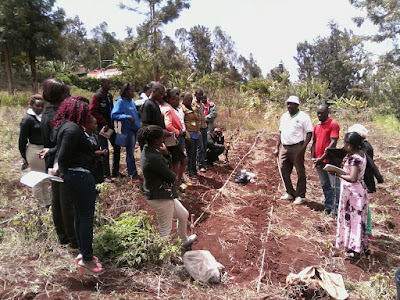By Bob Aston
Armed with a notebook and a pen, he took a vintage position and waited for Mr. Gachara Gikungu from Kilimo Biashara Promoters to begin the training.
Three years ago Mr. Eliud Kirema's fascination with agribusiness made him to leave Nairobi. He returned to Meru to start farming in his 6-acre piece of land. He expected to make huge profits but that has never been the case.
Low farm incomes made him to deliberate on how he would seek for agribusiness training. An opportunity soon arose when he heard from a friend about an agribusiness training organized by Sokopepe on October 28, 2016 at M.C.K Kalithiria Church in Tigania West. He decided to attend the training to see if he could learn more about agribusiness.
 |
| Farmers listening to Mr. Gachara Gikungu during the training |
Armed with a notebook and a pen, he took a vintage position and waited for Mr. Gachara Gikungu from Kilimo Biashara Promoters to begin the training.
Attending his first agribusiness lesson proved an eye opener for him. He looked solemn and occasionally shook his head in agreement as Mr. Gachara narrated how most farmers sell green maize at Kshs 3 each yet they had labored for close to 4 months. He equated the price of 3 green maize to one lollipop.
His facial expression kept changing depending on the topic of discussion. He laughed nervously when Mr. Gachara remarked that traders who roast maize earn more in a few minutes than what farmers earn from the same crop in 4 months as the traders buy the green maize at Kshs 3 and then sell at Kshs 20 after roasting.
He nodded in agreement as Mr. Gachara narrated how some maize farmers would celebrate at the end of the season when they make kshs. 20,000 yet they did not track their costs and revenues from farming and could as well have made a loss without knowing.
After the training he approached Ms. Dorcas Gachui, Sokopepe’s Production Information Agent (PIA) and inquired how he could join Sokopepe’s Farm Records Management Information System (FARMIS).
He paid the Kshs 500 subscription fee after Ms. Gachui had shown him how to adopt the service. Ms. Gachui informed him that FARMIS would enable him to appreciate farming as a business. The service would enable him to track the performance of his farm enterprises thus enabling him to make informed decision at the end of the season.
| Women farmers reading about FARMIS |
“I hope through Sokopepe my agribusiness will become more productive and profitable. I now know that I have to be an entrepreneur,” said Mr. Kirema.
Like any other smallholder farmer, Mr. Kirema has been having difficulties accessing various services for his farm enterprises such as adequate finance, functional markets, relevant and timely market information and high quality inputs.
“I could relate with most of the things that Mr. Gachara taught. It is clear that I have not realized the agribusiness potential of my farm,” said Mr. Kirema.
He has a vague sense of the direction his farm is taking as he has not kept proper records of his beans, maize and soya beans enterprises. He hopes that embracing agribusiness will increase his income and allow him to diversify to livestock farming.
His parting shot is that Sokopepe should continue organizing agribusiness training for smallholder farmers. He reckons that such trainings would enable more farmers to inculcate a culture of record keeping and practice agribusiness.


